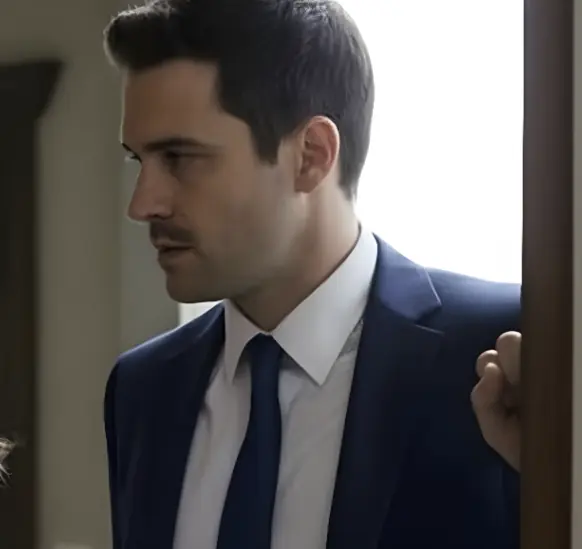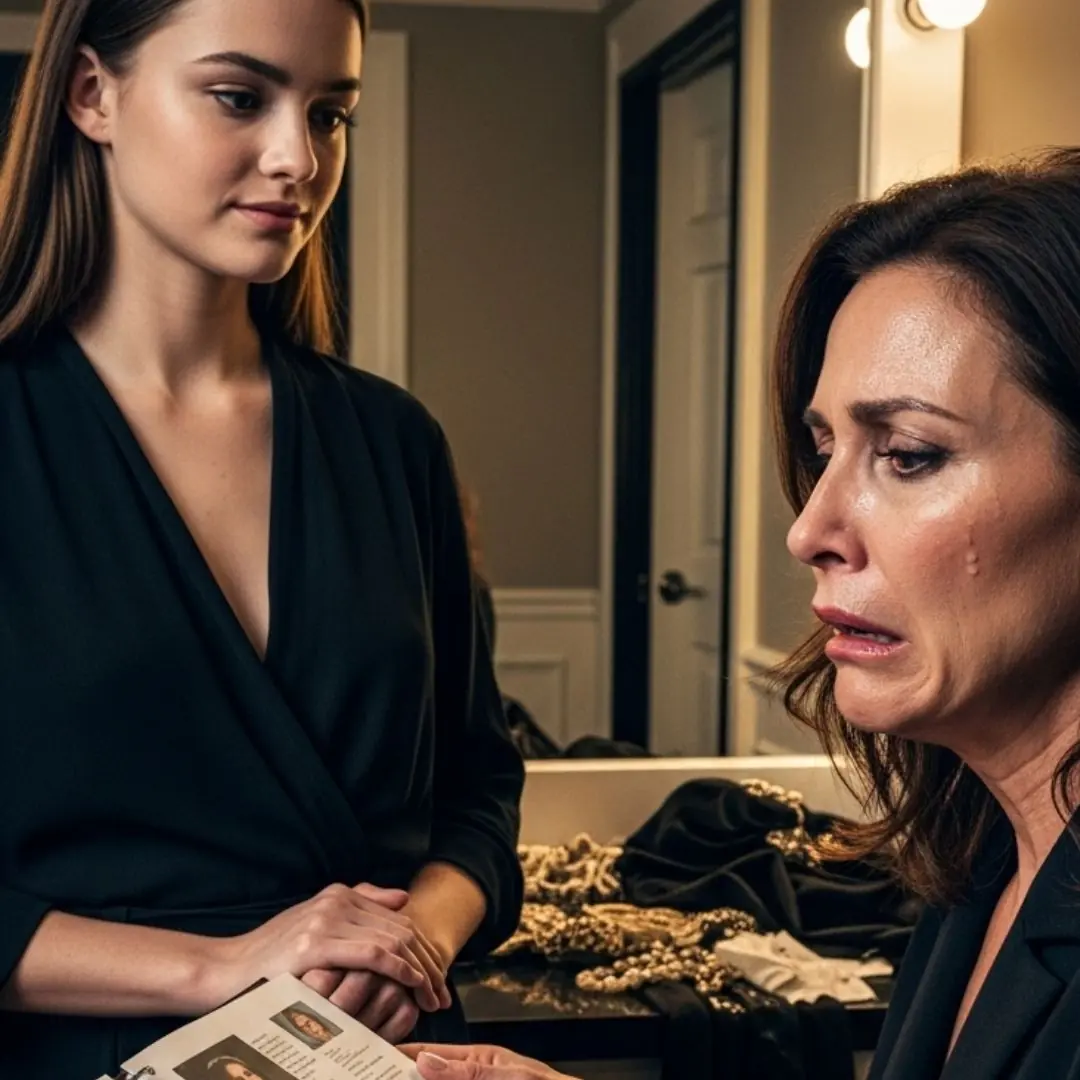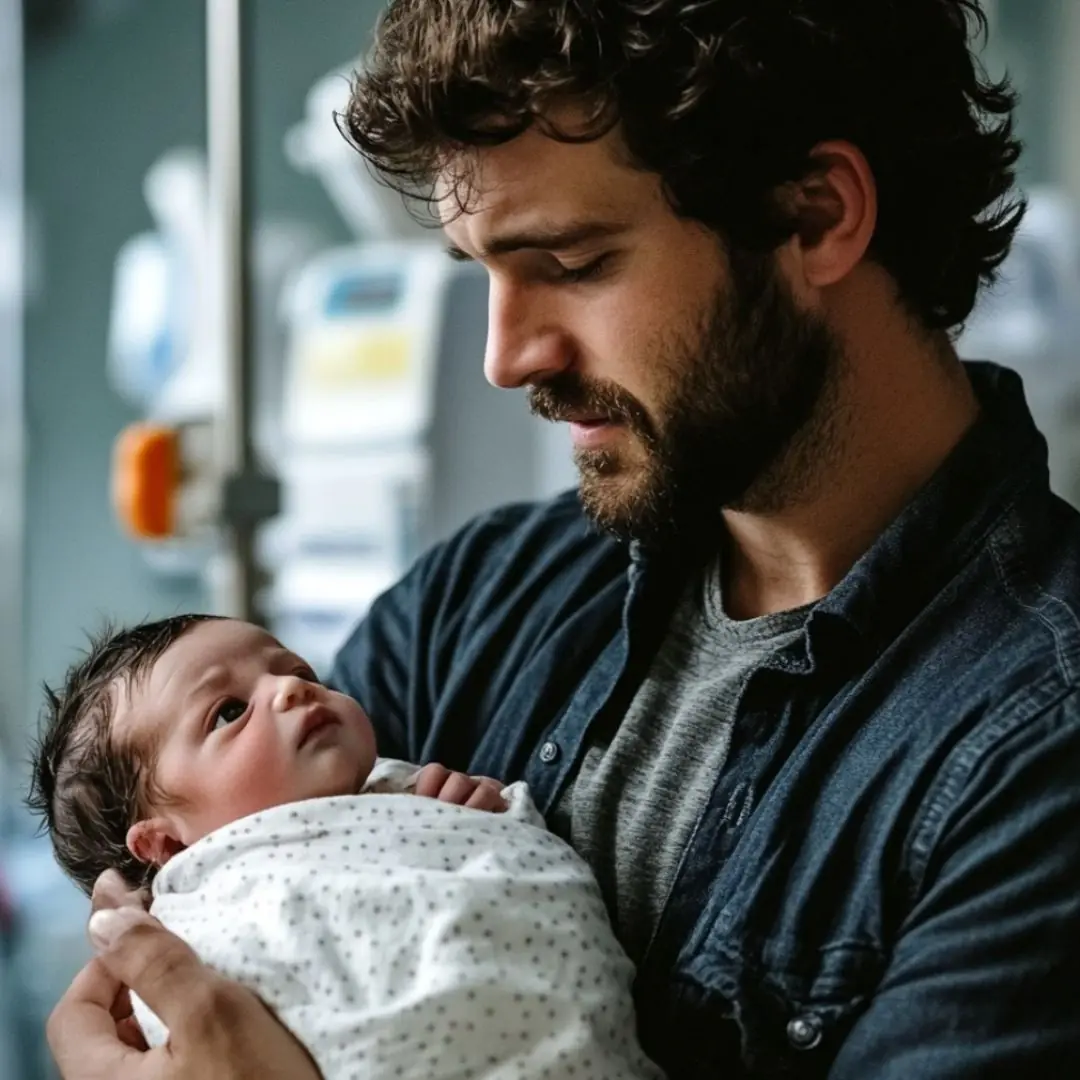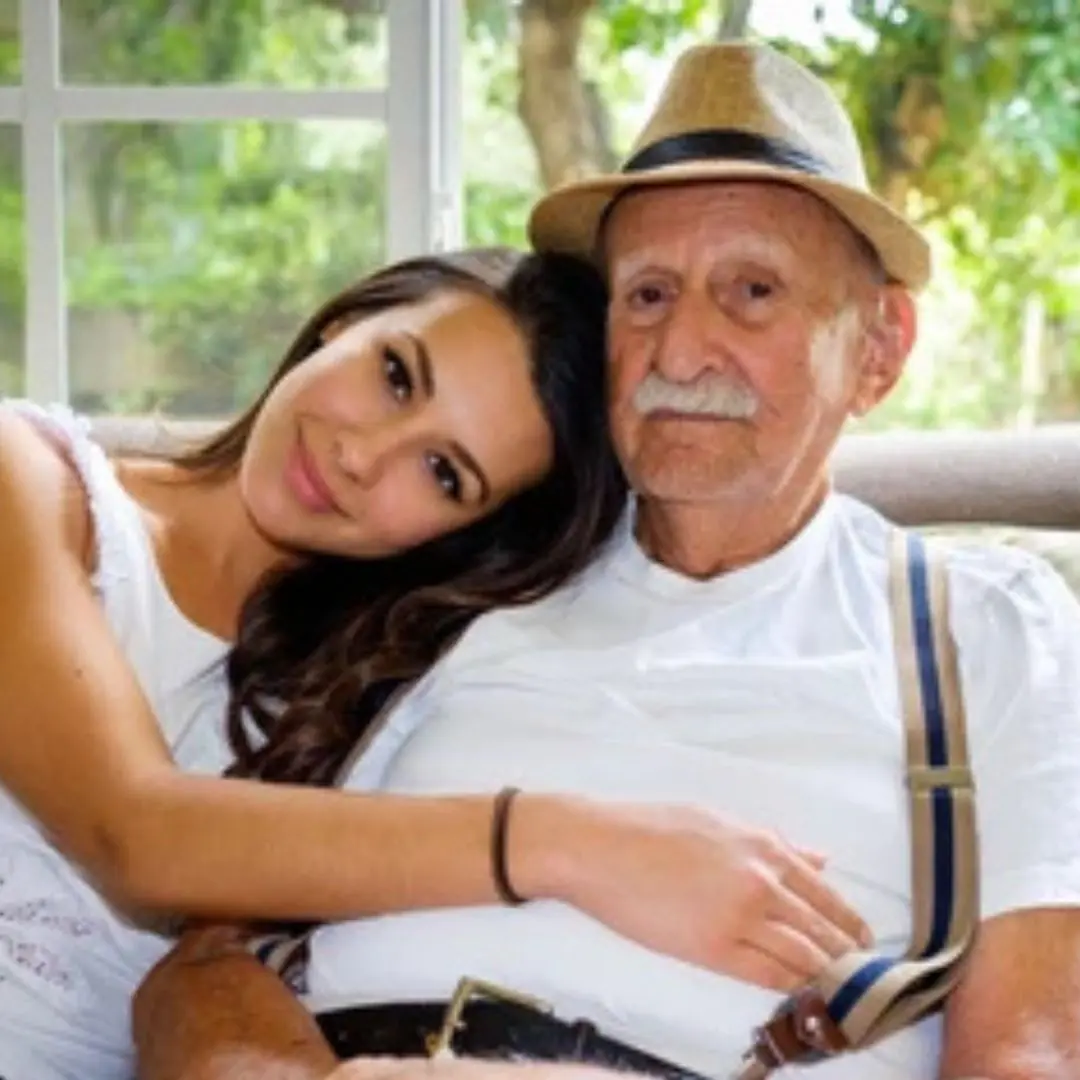
How an unexpected knock reunited a family and reshaped a father’s heart forever

The storm was a brutal force against the coastline that night, tearing at the windows of the old Victorian house perched precariously above the crashing waves. Elias Thorne lived in that house, a fortress of silent regret and carefully maintained solitude. Sixty-two years old, he had spent the last fifteen years perfecting the art of emotional distance, a self-imposed penance following the tragic death of his wife, Sarah, and the subsequent, irreparable estrangement from his only son, Daniel. Daniel, now a successful architect living three thousand miles away, communicated only through terse, yearly emails, a relationship reduced to the bureaucratic exchange of holiday pleasantries. Elias was wealthy, insulated, and utterly alone, his heart a calcified relic of unresolved grief. The howling wind was his only constant companion, mirroring the hollow roar inside his own chest.
It was precisely at 11:47 PM, during a momentary lull in the tempest, that the sound came—a tentative, yet surprisingly firm rap on the massive oak front door. Elias paused his nightly ritual of staring into the cold fireplace. He received no visitors; the few people who still had his number knew better than to disturb the hermit of the cliffs after sunset. The sound was so jarringly human against the backdrop of the storm that it felt unreal. He waited, hoping the wind had played a trick, but the knock repeated, slightly more urgent this time. Elias reluctantly rose, his joints protesting the sudden break in stillness. He peered through the security peephole and saw only a blurred figure shielded by a saturated hood, the porch light struggling to pierce the sheets of driving rain.
When he unlatched the heavy door, the wind immediately tried to rip it from his grasp, forcing him to plant his shoulder against the frame. Standing on his threshold was a young woman, soaked through, shivering violently, yet meeting his gaze with an uncanny, penetrating clarity. She couldn't have been older than twenty-five, but it wasn't her youth that froze Elias; it was her face. Her eyes, the precise shade of hazel and almond-shaped exactly like his late wife’s, were staring back at him. Before Elias could formulate the appropriate brusque question, she spoke, her voice surprisingly steady despite her distress. "Mr. Thorne? I'm so sorry for the hour. My name is Lena Vance. And I believe... I believe you might be my father."
The raw, unvarnished statement hit Elias with the force of a tidal wave, wiping away years of carefully constructed emotional defenses. He stood there, mute, the rain plastering his few remaining strands of silver hair to his forehead. Sarah, his wife, had died believing Elias had been entirely devoted to her since the day they met, but the truth, the festering secret that had poisoned his later years, was that during a brutal six-month separation early in their marriage, Elias had briefly sought solace elsewhere. The woman was Miriam, a brilliant, transient artist he had known in college, a connection rekindled and quickly severed out of devastating guilt. Elias had never told a soul, burying the brief, remorseful affair along with all its potential consequences. Seeing Lena now, seeing Miriam’s eyes staring back at him, the consequence had arrived, standing shivering on his porch.
He didn't invite her in immediately. He demanded proof, his voice ragged with disbelief and rising panic. Lena calmly reached into her saturated backpack, pulling out a sealed plastic envelope containing a worn photograph of Miriam, undeniably her mother, and a faded birth certificate listing Elias Thorne as the father. The dates matched the separation perfectly. The betrayal of Sarah, which he thought had been absolved by his subsequent devotion and her untimely death, had sprung back to life, demanding accountability. He finally stepped aside, the sheer weight of the moment overriding his instinct for self-preservation. Lena stepped into the warmth, bringing with her the smell of cold sea air and the unsettling reality of his past.
Lena wasn't looking for a handout or a dramatic confrontation; she was looking for a lifeline. Miriam had passed away a month prior after a protracted illness, leaving Lena entirely alone. Lena, a dedicated student trying to manage Miriam's mounting medical debts, had exhausted all options and, in her mother's final days, Miriam had given Lena the envelope, urging her to find Elias only as a last resort. Lena was facing eviction and needed stability—a roof, a moment to breathe, and maybe, just maybe, the acknowledgment of a paternal connection. Elias felt the familiar urge to write a check, to push her away with money, to solve the problem impersonally, but the sight of Miriam’s eyes looking at him with such quiet vulnerability paralyzed his habitual cynicism.
Lena’s presence in the house was a slow, agonizing demolition of Elias’s solitude. The old house, accustomed to silence, suddenly echoed with the unfamiliar sounds of a young woman's life—the soft music from her ancient laptop, the gentle tapping of keys as she worked on her college papers, the occasional, almost accidental laugh. Elias found himself watching her, observing the nuances of her face, seeing Miriam in the set of her jaw and, terrifyingly, seeing the ghost of his own youth in her expressions. She didn't press him for affection or answers, respecting his rigid boundaries, but her very existence was a constant, living question mark against his solitary narrative. He began leaving small, unintentional gifts for her: a better desk lamp, a new teapot, a rare, leather-bound volume he thought she might appreciate. He was communicating not through words, but through silent, material acts of care—a language he barely remembered how to speak.
The critical turning point came three weeks later. Elias had been staring at an old, framed photograph of Daniel and Sarah—a picture taken just before the estrangement—when Lena found him. She didn't rush in or offer platitudes. She simply walked up to the picture and gently ran her finger over Daniel’s smiling, seven-year-old face. "He looks kind," she observed quietly. "You look alike, too. Did he... did he know about Mom?" Elias shook his head, his throat tight. "No. No one knew." Lena nodded slowly. "My mom, she didn't want to hurt anyone. She said you were a good man who made one mistake. She said the only reason she didn't tell you was because she saw how devoted you were to Sarah and Daniel, and she didn't want to be the one to break that."
The unexpected absolution from the woman he had wronged, delivered through the daughter he never knew, cracked the concrete around Elias’s heart. He had spent fifteen years believing his betrayal was the fatal flaw that broke his world; now he realized his greatest sin wasn't the affair itself, but the cowardice that had kept him isolated from both his children. Lena wasn't a punishment; she was a gift—a living, breathing conduit back to the possibility of family.
"I haven't talked to Daniel... truly talked... since Sarah died," Elias admitted, the words tasting like rust. "He blames me for leaving the lights on that night. He blames me for the accident." Lena looked at him, her hazel eyes steady. "He's just grieving, Dad. And he's alone, too. He needs to know he has a sister. And he needs to know his father is still here."
Elias realized that the path to reconciliation with Daniel was not through shared grief or apology, but through a new, astonishing truth. He had to be honest about his past to build a future. Taking a deep, ragged breath, he picked up the phone. It took four tries to reach Daniel, and when the call finally connected, the silence stretched, thick and dangerous. "Daniel, it's Elias," he began, his voice surprisingly firm. "There's something I need to tell you. Something that changes everything. I have a daughter. Her name is Lena, and she's your sister."
The revelation was met with initial stunned silence, then explosive, disbelieving anger from Daniel, thousands of miles away. But Elias, anchored by Lena’s quiet presence in the room, held firm. He confessed the whole truth, the affair, the guilt, the fifteen years of self-imposed exile, and the crushing shame he had carried. Lena took the phone when Elias’s voice broke, her calm, kind voice explaining Miriam's life and her own quiet hope for connection.
It took weeks of fraught calls, but Daniel, a man grieving his mother and estranged from his father, found the undeniable reality of a new sister an emotional anchor he couldn't push away. He flew home. The reunion, held in the same cold, old Victorian house, was not sentimental; it was messy, angry, and achingly real. Daniel walked in, saw Lena's face, and the undeniable truth hit him. He didn't hug Elias; he hugged Lena first, the two half-siblings finding an instant, profound kinship. The process of forgiveness between father and son was slow, marked by painful, necessary conversations held over the next year. But Lena was the bridge, the living proof that life, even born from deep regret, could offer profound second chances. Elias’s heart, once a fortified tomb, was reshaped by the complex, demanding, and utterly fulfilling love of an unexpected daughter and a rediscovered son. The unexpected knock hadn't just reunited a family; it had finally allowed Elias Thorne to step out of the storm and truly live.
News in the same category


A single mother was not afraid to marry a widower with six children

My Stepmom Took the Christmas Gift My Dad Left Me And Told Me I Didnt Deserve It, Unaware It Was a Test

The Silent Bond: How My Autistic Brother’s First Words Changed Everything

She left her children in the fir forest for a life of wealth—but the past found her 18 years later

The orphan girl who inherited a modest house deep in the forest went mushroom picking and found an airplane… One look inside the cockpit changed everything…

Then have dinner with your mother, I’m going home, — I snapped at my husband who had brought my mother-in-law to the restaurant

At 61, I reunited with my first love — a remarkable story of love, healing, and a new beginning

A daughter growing up with love: how a devoted dad built a life of strength and family

5 nighttime symptoms while sleeping that could indicate can.cer

I Found My Husband’s Second Wedding Photos—And He’s the Groom and Father of the Bride

A DNA Test Revealed I Have a Son… But I’ve Never Given Birth

Echoes of the Forgotten Meadow

A Revealing Mother’s Day Gift That Changed Everything

My wife refused our deaf newborn: ‘leave him at the hospital—I’m not raising a child like this

The Little Boy And The Injured Sparrow

A young girl married an old man to save her family, but on their wedding night the old man did something terrible

She arrived without a suitcase, with just a paper bag. Her eyes expressed a fatigue that seemed less the result of a restless night than that of a lifetime of hardship

An Extraordinary Couple Welcomes a Healthy Daughter — A Story of Love, Loss, and Redemption
News Post

Ice Cream Bombe with Pistachio, Rosewater & Raspberry

The Quiet Cartographer Of The Backyard: A Story Of Pip, The Tiny Terrier With A Grand Plan

A single mother was not afraid to marry a widower with six children

My Stepmom Took the Christmas Gift My Dad Left Me And Told Me I Didnt Deserve It, Unaware It Was a Test

The Silent Bond: How My Autistic Brother’s First Words Changed Everything

She left her children in the fir forest for a life of wealth—but the past found her 18 years later

The orphan girl who inherited a modest house deep in the forest went mushroom picking and found an airplane… One look inside the cockpit changed everything…

Then have dinner with your mother, I’m going home, — I snapped at my husband who had brought my mother-in-law to the restaurant

At 61, I reunited with my first love — a remarkable story of love, healing, and a new beginning

A daughter growing up with love: how a devoted dad built a life of strength and family

Your Body May Be Telling You Your Arteries Are Clogged — 10 Signs to Know

Grandma’s Kraft Dinner

4 fruits that "feed" can.cer cells avoid them at all costs, no matter how cheap they are

5 nighttime symptoms while sleeping that could indicate can.cer

42-year-old man suffers sudden stro.ke despite not smo.king or drin.king: Doctor says it was caused by “three habits”

I Found My Husband’s Second Wedding Photos—And He’s the Groom and Father of the Bride

A DNA Test Revealed I Have a Son… But I’ve Never Given Birth

Echoes of the Forgotten Meadow
